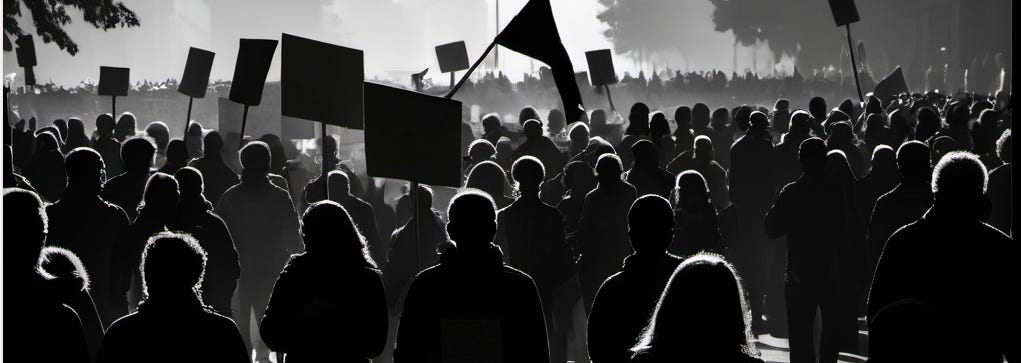Why woke capitalism is in trouble
RedBridge Director Kos Samaras explains why businesses embracing progressive causes to appeal to a cashed up, professional class of customer are increasingly going to attract a backlash.
Over the past two decades, businesses and the political establishment have shifted their focus toward a growing subset of Western society: a professional class with significant spending power and outsized influence in parliaments and boardrooms.
This group emerged from the IT-driven industrial revolution that reshaped economies in the 21st century, creating a new middle class that gradually replaced the 20th-century managerial class. The latter had long served as the ballast for centrist and centre-right politics. In Australia, this managerial middle class was often the decisive force in election outcomes, delivering Bob Hawke’s landslide victory in 1983 and John Howard’s equally substantial win in 1996.
Meanwhile, another class, whose position in Western society has endured despite a rapidly changing global economy, began to feel increasingly neglected. The working class and working poor, historically the backbone of the political left, saw their stable, sufficient incomes erode into precarious work and declining living standards. Many, particularly their children, have come to believe that this decline stems from political neglect and the dominance of a professional class that has drowned out their voices.
In the U.S., the Democratic Party confronted this reality in 2016, when Donald Trump’s victory revealed deep alienation among working-class voters. While Joe Biden’s 2020 win was seen as a course correction, the 2024 elections underscored lingering discontent. Similarly, in the U.K., Brexit served as a wake-up call, signalling a rejection of the political establishment by regions and communities that felt ignored. Across Europe, populist movements continue to thrive on these same frustrations.
In Australia, the Labor Party has so far weathered this storm better than its international counterparts, thanks to the country’s unique electoral system and the absence of a strong populist alternative. However, warning signs are evident: the party’s primary vote has languished in the low 30s for nearly a decade, reflecting a broader decline in its outer urban and regional vote. Central and Northern Tasmania is a great illustration of this.
Once a steadfast voting bloc, the working class and working poor have become a volatile “new swinging” group of voters.
In Australia, where populist options are limited, this demographic has become adept at tactical voting. They have helped elect Independents like Dai Le in Fowler and driven Labor’s primary vote in once-safe seats into the low 40s. Their influence is undeniable, and their unpredictability poses challenges for both political parties and businesses.
In the absence of a strong nation wide populist alternative, major political parties are beginning to target these voters, often by adopting populist policies. Peter Dutton is already making a noticeable pivot in this direction. By focusing on issues that resonate with disaffected voters, he appears to be recalibrating his political strategy to capitalise on their frustrations.
A striking example of this pivot is Dutton’s public criticism of Woolworths for removing Australia Day merchandise from its shelves, as well as his broader attacks on businesses that have scaled back or ceased operations on Australia Day. Dutton has framed these actions as emblematic of a cultural shift that, in his view, undermines Australian traditions and national identity. By doing so, he positions himself as a defender of mainstream values and a voice for those who feel alienated by parts of society that seem to have a monopoly on power and social status – progressive and corporate Australia. Woke capitalism.
This approach aligns with a growing backlash against "woke capitalism," where corporate gestures are seen as performative and disconnected from the realities of everyday Australians. By targeting symbolic issues like Australia Day, Dutton taps into a sense of cultural grievance that resonates deeply in outer suburbs and regional areas.
He has a bit to work with here.
For the past 20 years, businesses have aligned their strategies with the values of the professional class, focusing on diversity programs, climate policies, and progressive branding. While these initiatives have resonated with a stable and affluent demographic, they now risk alienating a growing and increasingly vocal group of new swinging voters.
As their political influence grows, businesses risk becoming symbols of elite neglect.
As their political influence grows, businesses risk becoming symbols of elite neglect. The backlash against “woke capitalism” is already evident in public boycotts and political campaigns, underscoring the urgent need for companies to reassess their priorities.
To thrive in this new landscape, businesses must pivot to building strong social bonds with the working class and working poor. This requires a shift from initiatives primarily designed to appeal to the progressive middle class toward efforts that address economic disparities and improve community well-being.
This doesn’t mean abandoning diversity or social progress but rather recalibrating these efforts to ensure they are inclusive of broader societal concerns. Programs that create local jobs, support small businesses, and invest in regional infrastructure will resonate far more than token gestures.
Over the next decade, inner-city voices will remain loud, leveraging their social capital and platforms to amplify their concerns. However, the roar of disapproval from outer suburbs and regions will grow louder. Ultimately, it is at the ballot box where their frustrations will reshape policies, governments, and the business environment.
For businesses, the choice is clear: adapt now or risk being swept away by the tide of discontent. The train of progress has changed tracks, and companies that fail to recognise this shift and engage meaningfully with the new swinging class may find themselves out of touch and vulnerable. Those that seize this moment, however, will not only navigate the volatility but also thrive in a more unpredictable future.



